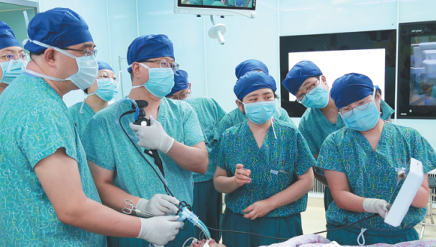Hospital collaboration aids medical reform
Updated: 2023-05-26

Medics from both Tongji and Bethune hospitals discuss a plan for a surgical operation of a critical patient. [Photo provided to China Daily]
On April 27, the renowned Bethune Hospital in Taiyuan, the capital city of Shanxi province, received a group of visitors from East China's Jiangxi province.
The visitors were from the Jiangxi Xiangya Hospital. The purpose of their tour was to learn about its experience in medical reform and management.
"Like many hospitals in China, we are in the second phase of medical system reform," said Liang Bin, Party secretary of Jiangxi Xiangya. "Here we have found the experience of Bethune Hospital can be inspiring and replicable for our reforming plans."
Starting its reform in 2019, Bethune Hospital is now the leading player in Shanxi's latest round of medical system reform.
To address the public requirements for affordable, accessible and better-quality medical services, the Chinese government began to implement a reforming initiative in October 2019, calling for the establishment of regional medical hubs in a number of provinces, municipalities and autonomous regions. The regional hubs feature the pairing of leading hospitals of two provincial-level regions to share their resources to benefit the broader public.
Shanxi and Central China's Hubei province were designated as one of the pilot regions in this reform, and Bethune Hospital in Shanxi and Tongji Hospital in Hubei are the leading hospitals.
But the two hospitals reacted even earlier than the Chinese government's formal announcement.
In August 2019, the two institutions signed an agreement to build cooperative medical hubs for the two provinces. In December that year, experts from Tongji Hospital were stationed in Bethune Hospital to help to launch joint development programs.
Tongji Hospital, an affiliate to the renowned Tongji Medical College of Huazhong University of Science and Technology, is a strong force in research and management, so the partnership can bring visible benefits to Bethune Hospital, according to an executive of the Shanxi-based hospital.
Benefiting from the partnership, Bethune Hospital now ranks among the top 100 in the nation in terms of CMI, or case mix index, said the executive, adding that there are also substantial improvements in research and education.
Wu Hua, vice-president of Tongji Hospital, is now the president of Bethune Hospital. In addition to leading an expert team to help to improve the research capability of the Shanxi hospital, he said the focus of his mission is to reform the existing medical system.
"All the reforms should benefit the general public," Wu said. "That is also the target of our reform in Bethune Hospital."
He noted that China began its first medical system reform campaign in 1985, which featured increasing autonomy for hospitals and operations according to market rules.
"The first reform led to the expansion of the medical service market and the accumulation of resources in bigger cities," Wu said. "But problems also arise, including the rapidly rising prices for medicines and services, and the inaccessibility of advantageous resources in smaller cities and rural areas."
Wu said now that the country is implementing a second reform to divert from the situation, Bethune Hospital's priority will be given to offering affordable, accessible and better-quality services to patients throughout the province.
"To reach this goal, we must rely on refined management to increase efficiency and cut costs; foster a competent force of medics to offer better services; and branch out to cover more patients in the province," Wu said.
One initiative is to shorten the hospitalization period of patients.
Liu Xiansheng, who is also from Tongji, is the vice-president of Bethune Hospital. He said the key to shortening the hospitalization period is scientific management.
"This is a practice closely relating to procedure management," Liu said. "It requires close collaborations among the testing, impatient and information technology departments. New technologies like big data analysis can substantially improve efficiency and optimize procedure management."
In 2022, the average hospitalization period for patients in Bethune Hospital was 8.86 days. That was 2.72 days less than that in 2020. In the first quarter of this year, the period was further cut to 8.46 days, according to Liu.
"A shortened hospitalization period means a decrease of costs for patients," Liu said. "Patients are also benefiting from substantial decreases in medicine prices, which are a result of our accurate procurement management."
As a part of its branching-out initiative, Bethune built its first county-level subsidiary in Yonghe in April 2019. Since then, the hospital has launched cooperative programs to support 35 county-level hospitals. In addition, its 26 departments have established regional alliances, offering assistance to more than 1,000 members throughout the province.
Jia Lijun contributed to this story.



